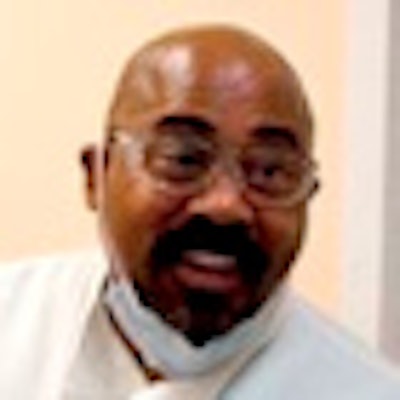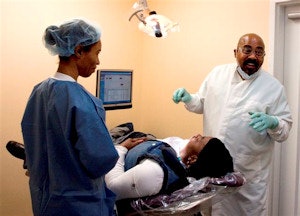
The clinic, with its white cinder block walls and old dental chair, is nothing fancy. The services offered are strictly no-frills. Yet there is always a waiting list to see Albert Cheek Jr., DDS.
After jailhouse fights, he sews up lips and noses with sure strokes like a tailor. He provides temporary fillings. And, with a deft skill borne of practice, he extracts teeth.
"This is the talent the good Lord gave me," he said.
He is a solidly built man, wearing green scrubs, a graduate of the Howard University College of Dentistry -- not too far from this correctional center in Prince George's County in Maryland.
 In addition to his weekly visits to three correctional facilities in Maryland, Dr. Albert Cheek runs a private practice and provides dental care to underserved and Medicaid patients at two inner-city clinics in Washington, DC. Photo courtesy of Jane Cave.
In addition to his weekly visits to three correctional facilities in Maryland, Dr. Albert Cheek runs a private practice and provides dental care to underserved and Medicaid patients at two inner-city clinics in Washington, DC. Photo courtesy of Jane Cave.
His current patient is a scrawny, young inmate wearing an orange jumpsuit.
"We are removing wisdom teeth," Dr. Cheek said. "They were just rotted, causing him severe headaches for the last four or five years."
Many of the 1,200 men and women in this correctional center have not gotten much dental care in their lives. Here, facing charges up to murder or serving sentences for lesser crimes, they wait anxiously and gladly pay $4 a visit, seeking mostly the kind of care that relieves pain.
"We become the dental plan for many people in the correctional facility," Dr. Cheek said.
In a moment, his current patient's rotten third molars lie defeated on a metal tray.
Dr. Cheek grew up in Texas, the son of a mostly absent father and a single mother who worked as a waitress and bartender. The shame of paying for groceries with food stamps and getting swept up with other innocent black kids by police seeking a suspect gave him a soft spot for the poor and downtrodden. And helping around the house -- mending screens, drilling, spackling, pulling nails -- made him good with his hands.
From an early age, he wanted to be a dentist. But getting to dental school, he said, turned out to be a "dream deferred."
A lot of it was the money. Paying off the debt from his undergraduate education at Howard University -- working in banks and installing modular office furniture -- took him a full decade.
It was 1995 and he was 35 when he finally got to the college of dentistry. Going through a divorce during his second year threatened to sidetrack him. But he moved into an abandoned building on campus rather than let go of dental school.
"Nothing was going to get me out," he said.
When he finished in 1999, he intended to continue his education.
"I wanted to be a facial reconstructive surgeon and live on a yacht," he said. But he had two kids to feed. So he found work in a county jail.
"This is where I am," he said, philosophically.
A balancing act
Clearing up a backlog in one Maryland institution led to work in others, and his career began to evolve. These days, in addition to keeping office hours at Cheek To Cheek Dental -- his family, cosmetic, and preventive practice in Washington, DC -- and visiting two inner-city clinics to treat Medicaid and homeless patients, he makes weekly trips to Maryland where he works in three county correctional centers.
“You tend to get much more advanced dental disease than you would see in the free world.”
— Jack Davidson, MD, chief medical
officer, Correctional Medical
Services
He's in Prince George's County two mornings a week, one of a group of healthcare providers serving the county correctional system as subcontractors for the St. Louis-based Correctional Medical Services, a large firm with contracts in 10 states to provide medical and dental services in 330 jails and prisons. Like Prince George's County, many jurisdictions rely upon contractors to provide the care, according to Jack Davidson, MD, chief medical officer for Correctional Medical Services.
Working conditions are designed to be secure, and salaries are competitive with those found in private practice. And, like Dr. Cheek, many jail and prison dentists say they find their work very meaningful, according to Dr. Davidson.
"You really are providing care to people who need it and have been without it for a long time," he said.
As a result, dentists working behind bars find plenty of challenges, Dr. Davidson added.
"You tend to get much more advanced dental disease than you would see in the free world," he said.
Nicholas Makrides DMD, MPH, a captain in the U.S. Public Health Service and chief dentist for the Federal Bureau of Prisons, agreed. Many of these prisoners have led tough lives and you can see it in their mouths.
"The oral health needs are often great given that many inmates come from disadvantaged backgrounds and have a low socioeconomic status," he said.
And while treating such a population does not appeal to everyone, the opportunities are there.
"Luring young dentists into public health and prison dentistry is often difficult," Dr. Makrides said. "However, the recent changes in the economy have caused many to reconsider a career in corrections."
With the incarcerated population of the U.S. surpassing the 2 million mark, there is a steady need.
Correctional institutions are constitutionally required to provide adequate healthcare services to inmates, as was recently reaffirmed by the U.S. Supreme Court in the case of Brown v. Plata. The case did not deal specifically with dental care. But in accordance with the settlement of another suit in California, Perez v. Cate, filed in 2005, independent court-ordered dental experts are monitoring the state's progress in improving the quality of dental care and access to care for inmates.
Back in Prince George's County, behind the high fence, razor wire, and locked doors, Dr. Cheek examines the teeth and jaws of his next patient.
"You are losing major bone," he told the patient. "You can't grow any more," he added, launching into a favorite lecture. "Even Shaquille O'Neal can't buy no bone."
"When I chew, they hurt," the patient said.
"You have three real bad ones," Dr. Cheek said. He takes a closer look at one molar, noting that "the only thing holding it up is calculus."
"Take out the side that hurts," the patient said.
"We'll take out 14, 15, and 16," Dr. Cheek answered.
Dr. Cheek hopes the young man will be able to scrape together the money for dentures when he gets out. They don't make them at the correctional center, he noted. "We'd have the whole jail coming in to get plates," he said.
And once again, Dr. Cheek turns to his most trusted tool.
"Just a regular old elevator -- a No. 34 elevator. I could probably get myself out of jail with one of these."
Soon, the teeth are out. The patient wants to see them. Dr. Cheek holds up the worst one, reeking of decay.
"You can smell it!" he said. Then he points out the gaping hole in the ruined molar.
"When Prince George's came looking for you, you could've jumped in that and they would still be lookin'!"
The inmate's eyes widen thoughtfully. Then the dentist in the green scrubs and the wiry man in the orange jumpsuit both laugh.



















